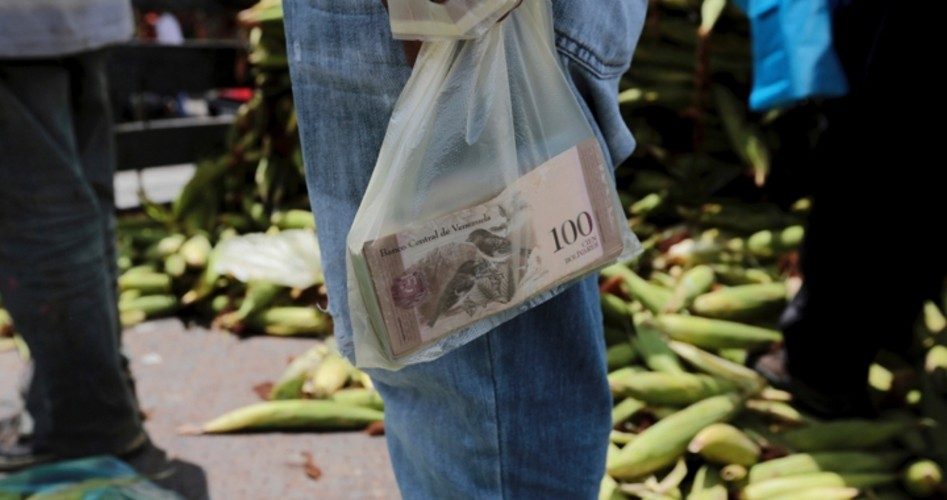
It took 41,000 bolivars of the Venezuelan currency to purchase a single American dollar on November 1. Three weeks later it took 84,000 bolivars. Back on January 1 Venezuelans could trade just 3,100 bolivars to purchase a dollar. Patrick Gillespie, writing for CNNMoney, did the calculation: Inflation in Venezuela is running at a rate of 4,000 percent a year.
Which explains why Venezuelans are increasingly turning to barter in order to survive. A loaf of bread can be traded for a handful of beans because each has intrinsic value and can’t be degraded through a printing press.
It’s also symptomatic of the end stages of every socialist enterprise which is allowed to run its course. First is the desire on the part of politicians to buy votes and support of the people by promising to give them things they didn’t earn. In Hugo Chávez’s case it was easy: the country’s massive oil reserves were being sold on the world market at great profit to PdVSA, the once privately-held oil company. It was nationalized in 1976 and its workers replaced by Chávez in 2006. Those workers were given a choice: support Chávez or lose their jobs. Chávez’s energy minister was explicit: “PdVSA’s workers are with this revolution, and those who aren’t should go somewhere else. Go to Miami!”
PdVSA became the primary funding source for Chavez’s red revolution: the huge expansion of the welfare state without requiring the people themselves to pay for it.
When oil prices headed south, so did PdVSA’s revenues. Off by 40 percent, Chávez had two choices: cut back on the welfare state, or print the money to continue to pay for it.
When Chávez died of colon cancer in 2013 at age 59, his protégé Nicolas Maduro took over and continued Chavez’s socialist experiment. He borrowed against the country’s oil reserves — some $150 billion against an economy that generated just $250 billion a year — and expanded the money supply to continue to fund it.
From there it was downhill: as the economy slowed, its descent accelerated, arcing into today’s catastrophe. Inflation of the currency forced prices higher, which led to price controls, and then to rationing. Rationing led to shortages, which impacted the most vulnerable in Venezuela: the very young and the very sick. When hospitals couldn’t obtain medicines, they required incoming patients to bring their own. As food supplies disappeared from store shelves, so did dogs in the street. Race horses were killed for their meat. Other horrors went unreported as the people did what they had to to survive. According to other reports, the average citizen in Maduro’s socialist paradise is down to two meals a day and has lost 20 pounds of body weight as a result.
And now, according to the American Institute for Economic Research (AIER), has come barter: Venezuelans are giving up using the essentially worthless bolivar and using real goods in its place.
This is the final step: the destruction of the division of labor. In modern economies that division has led to ever higher standards of living for one simple reason: an individual could specialize in a part of the supply chain of goods headed for market. With the reduction of labor costs, the costs of those goods and services declined sharply, improving the standards of living of everyone in that chain. Coupled with the rule of law, private ownership of capital (including what one earned with his labor), and enforcement of contracts, individuals invested their increasing quantities of available capital into more and more efficient means of production. All of this is familiar to students of Adam Smith, who explained in his 1759 book The Theory of Moral Sentiments that each individual didn’t have to know how the system worked to the advantage of everyone in order to participate in it and enjoy its benefits:
The proud and unfeeling landlord views his extensive fields, and without a thought for the wants of his brethren, in imagination consumes himself the whole harvest …
The rich…are led by an invisible hand to make nearly the same distribution of the necessaries of life, which would have been made, had the earth been divided into equal portions among all its inhabitants, and thus without intending it, without knowing it, advance the interests of the society….
But break that chain and the participants are left to fend for themselves. They go back to the enormously inefficient means of growing their own beans and baking their own bread and trading what might be left over for other essentials of life.
John Fortschen told the story of what happens next in his searing and heart-wrenching novel that made the New York Times’ bestseller list in 2011: One Second After. The population of the tiny community in North Carolina where he places the story shrank by 90 percent, leaving alive only those who could produce enough to sustain themselves and obtaining the skimpiest of life’s other necessities through barter with those others still living.
Socialism isn’t progressive; it is regressive. Left alone, it will destroy the society upon which it is inflicted, and turn that society back to the economic Dark Ages. That, unfortunately, is where Venezuela and its hapless and defenseless citizens are headed, thanks to Chávez and Maduro.
Photo: AP Images
An Ivy League graduate and former investment advisor, Bob is a regular contributor to The New American magazine and blogs frequently at LightFromTheRight.com, primarily on economics and politics. He can be reached at [email protected].
Related articles:
Credit Agencies Declare Venezuela in Default
Venezuela Falling Behind on Its Payments, Putting Maduro’s Regime in Jeopardy



